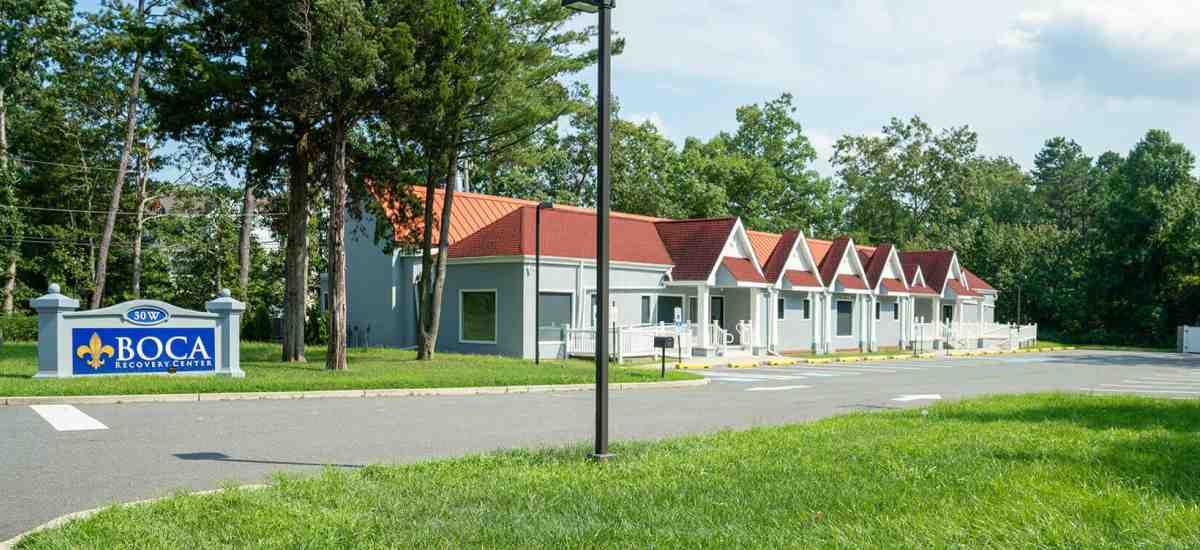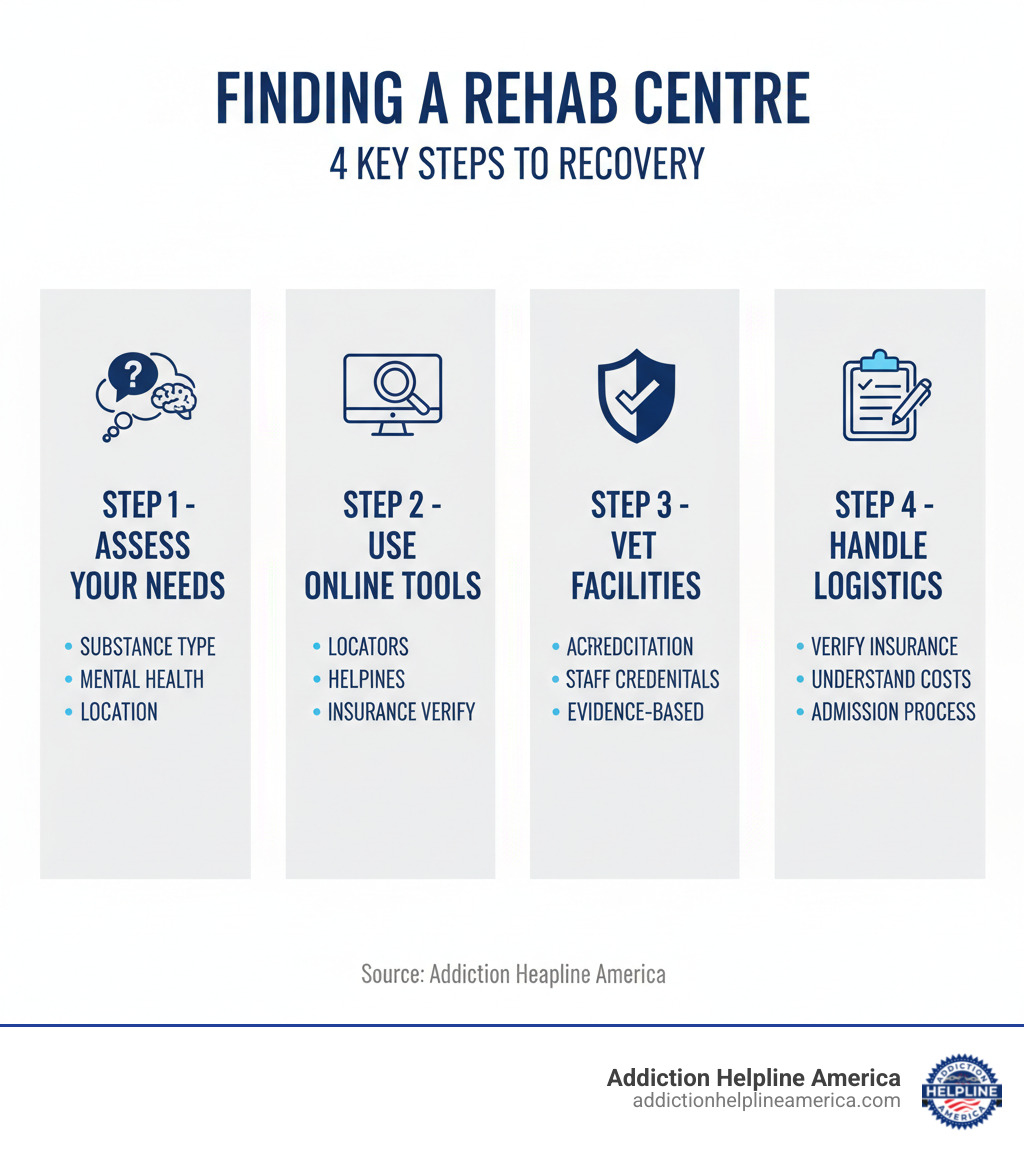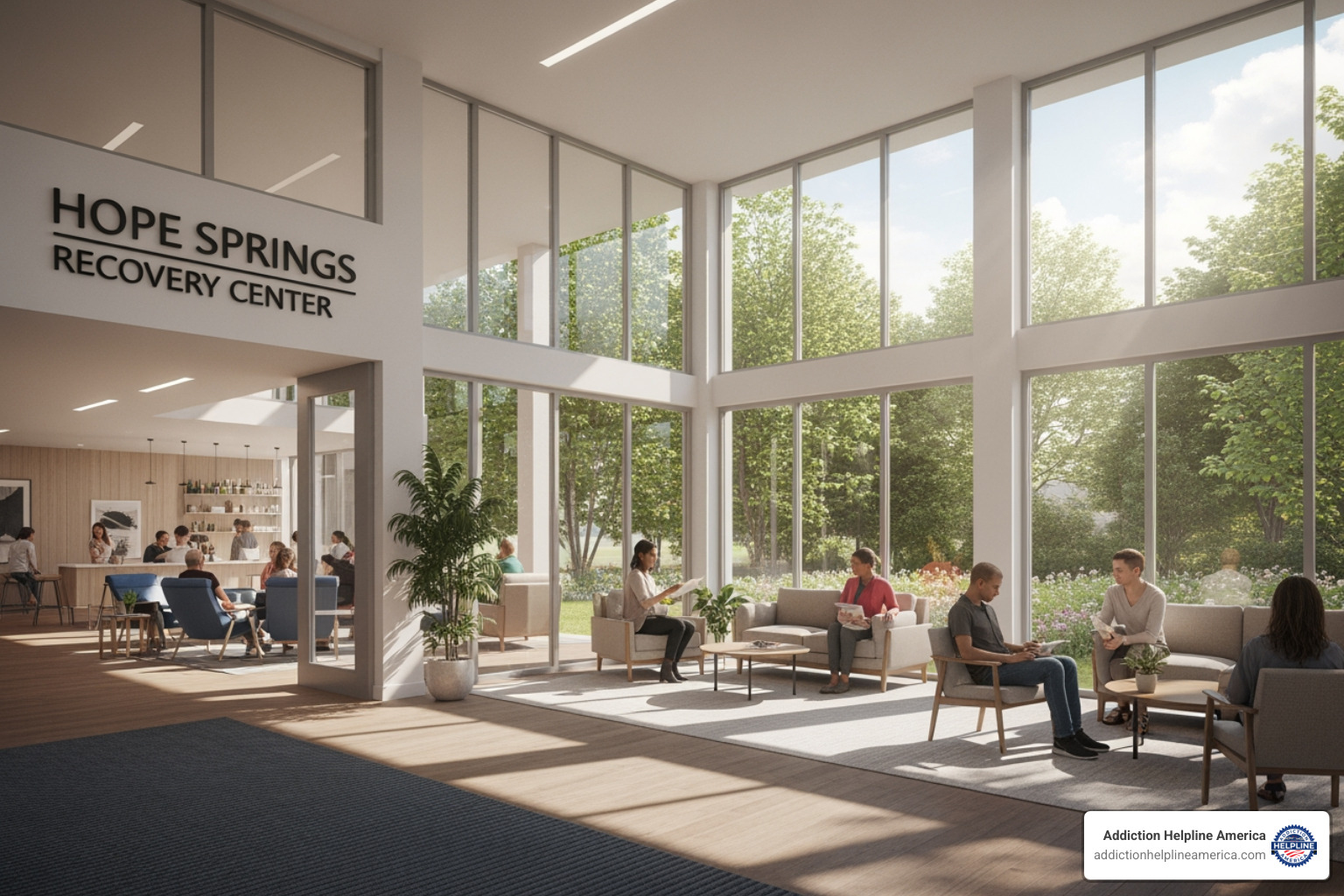
Why Finding a Rehab Centre Quickly Matters When Every Day Counts
Finding a rehab centre can feel overwhelming when addiction is taking control of your life or the life of someone you love. You need help now, but where do you start?
Quick Answer: How to Find a Rehab Centre Fast
- Use online treatment locators – Search confidential directories like FindTreatment.gov or Addiction Helpline America’s tool to filter by location, insurance, and treatment type
- Call a 24/7 helpline – Get immediate guidance from trained professionals who can match you with appropriate facilities
- Check accreditation – Verify facilities are licensed and accredited by organizations like The Joint Commission or CARF
- Verify insurance coverage – Contact facilities directly to confirm they accept your insurance and understand out-of-pocket costs
- Act quickly – The sooner treatment begins, the better the chance for successful recovery
With over 20 million Americans facing substance use disorders, many feel trapped and unsure where to turn. The good news is that online tools have revolutionized the search for help. Confidential, searchable databases put thousands of treatment options at your fingertips, eliminating the need for endless phone calls.
This guide walks you through a proven, step-by-step process for finding quality addiction treatment fast. You’ll learn how to assess your needs, use powerful online search tools, vet facilities, and handle the logistics of admission and payment.
Time is critical in recovery. Delays can worsen consequences, but rushing into the wrong program is also a risk. The key is to work both smart and fast, using the right tools to make an informed decision quickly.
At Addiction Helpline America, we’ve helped thousands of individuals and families steer this process. Our team connects people with vetted treatment options nationwide, providing confidential support 24/7 to help you take that crucial first step toward recovery.
Learn more about finding a rehab centre:
Step 1: Assess Your Needs to Refine Your Search
Before you start your search, finding a rehab centre that works begins with understanding your specific needs. Individualized treatment is essential for lasting recovery because everyone’s history with substance use, mental health, and life circumstances is different.
About half of people with a substance use disorder also have a co-occurring mental health challenge like depression or anxiety. In these cases, a Dual Diagnosis Treatment Facility is crucial. Treating addiction while ignoring an underlying mental health condition is rarely effective. Your personal goals also matter—knowing what success looks like for you helps you choose the right path.
How to Determine if You or a Loved One Needs Rehab
Addiction changes the brain, making it hard to see the problem clearly. Recognizing the signs is the first step.
- Behavioral changes: Increased secrecy, lying, irritability, or aggression. Responsibilities at work, home, or school are neglected as substance use becomes the priority.
- Physical symptoms: Unexplained weight changes, poor hygiene, bloodshot eyes, or shaky hands. Withdrawal symptoms like sweating, nausea, or anxiety appear when the substance wears off.
- Social withdrawal: Avoiding family and old friends, or only socializing with others who use substances. Addiction thrives in isolation.
- Failed attempts to quit: Trying to stop or cut back multiple times without success is a clear sign that professional help is needed. This isn’t a moral failing; it’s a symptom of a chronic disease.
Admitting you need help isn’t weakness. It’s the first step toward getting your life back.
Identifying Your Specific Treatment Requirements
Once you’ve acknowledged the need for help, get specific to find a program that truly fits.
- The substance: Treatment for alcohol differs from treatment for opioids or cocaine. For opioid use, medication-assisted treatment (MAT) may be essential. Our Opiate Addiction Treatment resource explains this further.
- Mental health needs: If you’re also battling depression, anxiety, or PTSD, you need a program that treats both simultaneously. You might explore finding a Therapist for Depression and Anxiety as part of your plan.
- Location: Some people recover better close to their family support system, while others need distance from triggers. Our Drug Rehab Facilities Near Me Guide can help you weigh the pros and cons.
- Amenities and environment: Consider what setting will help you heal. Some prefer a no-frills, structured environment, while others benefit from holistic therapies like yoga or art. Our Luxury Drug Rehab Malibu Guide details what high-end programs offer.
Answering these questions creates a clear picture of what you’re looking for, giving you the best chance at lasting recovery.
Step 2: Use Online Tools for Finding a Rehab Centre
Now that you’ve assessed your needs, you can start searching for what’s available. Finding a rehab centre is no longer an overwhelming task. Today’s online tools put thousands of treatment options at your fingertips, allowing you to find help confidentially and efficiently.
Using Trusted Treatment Locators
Several trusted platforms can help you find legitimate facilities that match your criteria.
FindTreatment.gov is a comprehensive, confidential resource from SAMHSA (the Substance Abuse and Mental Health Services Administration). It provides verified, up-to-date information on treatment facilities nationwide, allowing you to search anonymously by location, services, and payment options.
Here at Addiction Helpline America, our own Find a Rehab Centre Tool lets you search our vetted network of treatment centers across the country. You can filter by insurance, dual diagnosis treatment, gender-specific programs, and more to quickly narrow your options. We also offer specialized directories, like our Opioid Treatment Program Directory, to help you find specific types of care.
These locators transform an overwhelming search into manageable steps. Start with a location, specify the treatment type you need, and filter by insurance to save time.
National Helplines and Support Lines
Sometimes, you need to talk to a real person. National helplines offer immediate, compassionate guidance.
- SAMHSA’s National Helpline (1-800-662-HELP): This free, confidential, 24/7 service provides referrals to local treatment facilities, support groups, and community-based organizations in English and Spanish.
- 988 Suicide & Crisis Lifeline: If you or a loved one is in an immediate mental health crisis, you can call or text 988 anytime for urgent emotional support and connection to resources.
- Addiction Helpline America: Our support line specializes in matching people with the right recovery programs from our network. We can discuss your needs, help verify insurance, and provide personalized referrals. Explore our resources on our Addiction and Rehab Hotlines page.
A confidential call can be the fastest way to get clear, expert advice.
Understanding Different Types of Rehab Programs
Rehab isn’t one-size-fits-all. Understanding the different levels of care helps you find the right fit for your current needs.
- Detox Treatment: This is often the first step. Detox Treatment provides a medically supervised environment to safely manage withdrawal symptoms before therapy begins.
- Inpatient/Residential Rehab: This involves living at the facility for, typically, 30 to 90 days. Inpatient Drug Rehab offers a structured, substance-free environment, which is ideal for those with severe addictions or an unsupportive home life.
- Outpatient Rehab: This allows you to live at home while attending scheduled treatment sessions. Programs vary in intensity, from Partial Hospitalization (PHP), which is like day treatment, to Intensive Outpatient (IOP) and standard weekly therapy.
- Virtual Rehab: A growing option, Virtual Rehab delivers therapy and support online or by phone. It’s an excellent choice for those facing barriers like distance or mobility issues.
Many people move through several levels of care as they progress in recovery. Our guide on Types of Treatment Programs offers a complete overview.
Step 3: Vet Your Options and Steer Logistics
After identifying potential centers, it’s time to vet your options and handle the practical details. This final checkpoint ensures the quality of care matches what’s promised, a crucial part of taking your First Steps to Recovery.
Protect yourself or your loved one by verifying the quality of any facility you consider when finding a rehab centre.
Critical Factors for Your Checklist when finding a rehab centre
- Accreditation: This is non-negotiable. Look for accreditation from reputable bodies like The Joint Commission or CARF. This proves a facility meets high national standards for quality and safety.
- Staff Credentials: Ensure the team includes licensed professionals like medical doctors, psychiatrists, and certified addiction counselors (LADC, LPC, CAC). Their expertise directly impacts the quality of your care.
- Evidence-Based Practices: Effective treatment is built on therapeutic approaches backed by research. Ask if the facility uses methods like Cognitive Behavioral Therapy (CBT), Motivational Interviewing (MI), and Medication-Assisted Treatment (MAT). These are often part of comprehensive Therapy programs.
- Success Rates: Be wary of centers claiming 100% success. Addiction is a chronic disease. Instead, ask how they measure and track long-term outcomes. Transparency is a sign of a quality program.
- Patient-to-Staff Ratio: Ask about this ratio to ensure you will receive sufficient individual attention.
What to Expect During the Rehab Process
Most programs follow a similar structure to guide you from crisis to recovery.
- Intake Assessment: A comprehensive evaluation of your physical health, mental health, and substance use history to create your personalized treatment plan.
- Detoxification: If needed, this is a medically supervised process to safely manage withdrawal. Our guide on the Stages of Detox explains this phase.
- Therapy and Counseling: The core of rehab includes individual, group, and family therapy to address the root causes of addiction and build coping skills.
- Aftercare Planning: Before you leave, your team will create a plan for continued support, which is vital for long-term success. This may include sober living, ongoing therapy, or support groups. Learn more in our Post Rehab Drug Rehab Aftercare guide.
Understanding Rehab Costs and Payment Options
Don’t let cost be a barrier to getting help. The financial toll of addiction is almost always greater than the cost of treatment. While costs vary by program type and location, many payment options exist.
- Private Insurance: The Affordable Care Act requires most plans to cover substance use treatment. Our guide on Insurance That Covers Rehab can help you understand your policy. Always verify coverage with the facility and your provider.
- Medicaid and Medicare: These government programs provide crucial coverage for eligible low-income individuals, seniors, and people with certain disabilities.
- Sliding Scale Fees: Many non-profit and state-funded centers adjust costs based on your income.
- Payment Plans & Loans: Some facilities offer installment plans, and medical loans are another option.
- Scholarships and Grants: Ask facilities about any available financial assistance programs.
- Free and Low-Cost Rehab: State and non-profit organizations operate programs for those with limited financial resources. Our Free Drug Rehab Centers Guide 2025 can help you find them.
At Addiction Helpline America, our team specializes in helping people steer insurance and find affordable care.
Frequently Asked Questions about Finding a Rehab Centre
How long does a typical rehab program last?
The length of rehab is custom to individual needs. It depends on the severity of the addiction, the substance used, and any co-occurring mental health disorders. While 30, 60, and 90-day programs are common, research from the National Institute on Drug Abuse suggests that 90-day programs are often more effective because they provide adequate time to address complex issues and build a solid foundation for recovery.
Some individuals may need long-term residential care lasting several months. The key is that treatment should last as long as is clinically necessary, not for a predetermined amount of time. Many people step down from residential treatment to outpatient care to gradually transition back to daily life with continued support.
Can I lose my job for going to rehab?
This is a common fear, but federal laws offer significant job protection.
- The Family and Medical Leave Act (FMLA) allows eligible employees to take up to 12 weeks of unpaid, job-protected leave for medical reasons, including substance abuse treatment. Your employer must hold your job or provide an equivalent one upon your return.
- The Americans with Disabilities Act (ADA) protects individuals in recovery from a substance use disorder from employment discrimination. An employer cannot fire you for seeking treatment.
It’s wise to speak with your Human Resources (HR) department to understand your company’s policies and follow the proper procedures. These conversations are confidential, and you are not required to share all the details of your medical situation with coworkers.
How do I help a loved one who is resistant to going to rehab?
It’s heartbreaking when a loved one refuses help. You can’t force them into recovery, but you can change your approach.
- Communicate with concern, not judgment. Use “I” statements to express how their behavior affects you. For example, say “I’m worried about you” instead of “You have a problem.”
- Stop enabling. Enabling is any action that protects your loved one from the consequences of their addiction, such as giving them money or making excuses for them. Setting firm boundaries is crucial, even if it feels difficult.
- Educate yourself. Understanding addiction as a brain disease can help you respond with more compassion and less frustration.
- Consider a professional intervention. A trained interventionist can help you and other family members stage a structured, non-confrontational meeting to break through denial and present a clear path to treatment.
- Get support for yourself. You cannot pour from an empty cup. Groups like Al-Anon or Nar-Anon, as well as family therapy programs like Family Therapy Pasadena, provide vital support and coping strategies for you.
Finding a rehab centre for a loved one often starts with finding support for yourself.
Conclusion
Navigating the path to finding a rehab centre takes courage, and you’ve already taken the first step by seeking information. Recovery is not just a possibility—it’s within reach, and you now have a roadmap to get there.
We’ve covered the essential steps: assessing your unique needs, using online tools to find help, and vetting facilities to ensure quality care. We’ve also demystified the treatment process and explored the many payment options that make recovery accessible.
Here’s the most important takeaway: you don’t have to do this alone.
At Addiction Helpline America, our mission is to provide free, confidential guidance to people just like you. Our team is available 24/7 to answer your questions, help you understand your options, and connect you with a vetted treatment center from our nationwide network that fits your specific situation.
The hardest part is often making that first call. But when you do, you’ll find compassionate professionals ready to help you take the next step toward healing.
Recovery starts with a single decision. Make it today.
Our helpline is 100%
free & confidential
If you or someone you care about is struggling with drug or alcohol addiction, we can help you explore your recovery options. Don’t face this challenge alone—seek support from us.
Programs
Resources
Will my insurance
cover addiction
treatment?
We're ready to help
Find the best
drug or alcohol treatment
center
Are you or a loved one struggling with addiction? Call today to speak to a treatment expert.
















